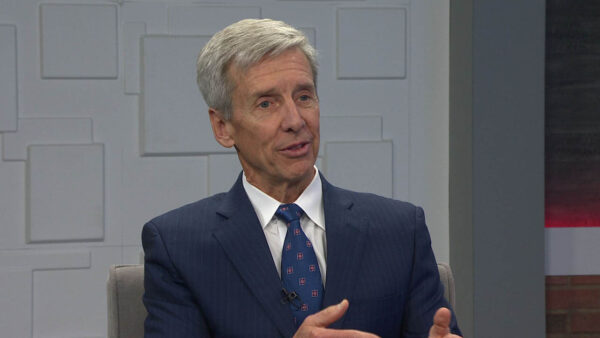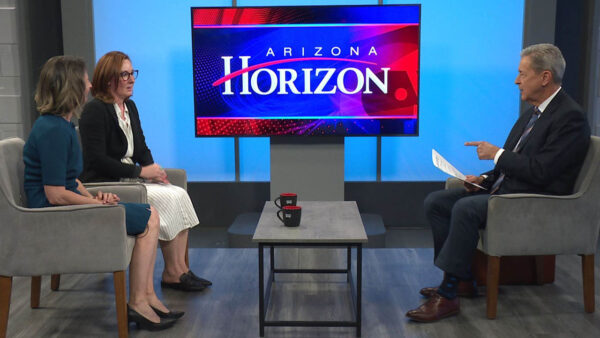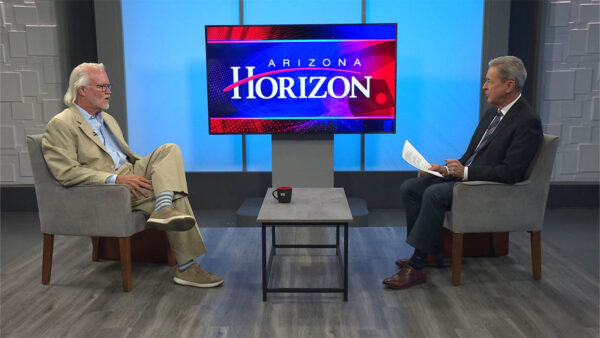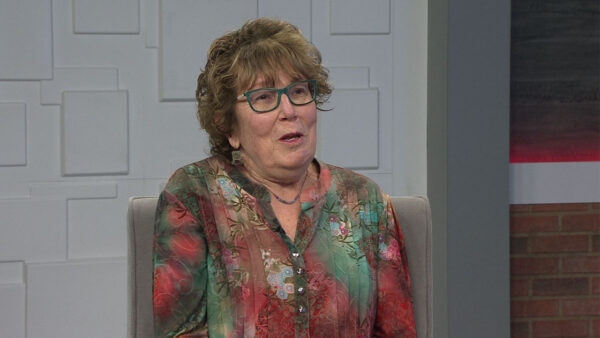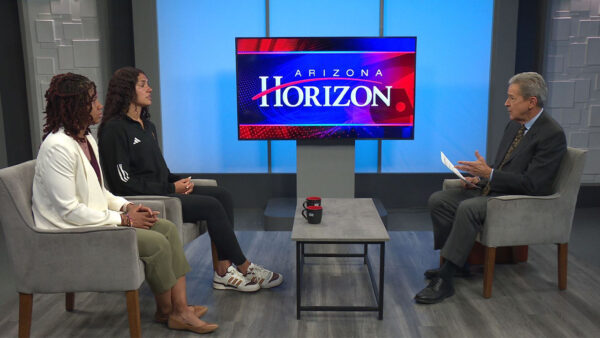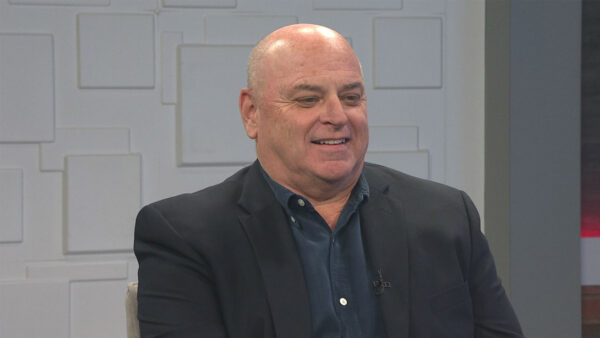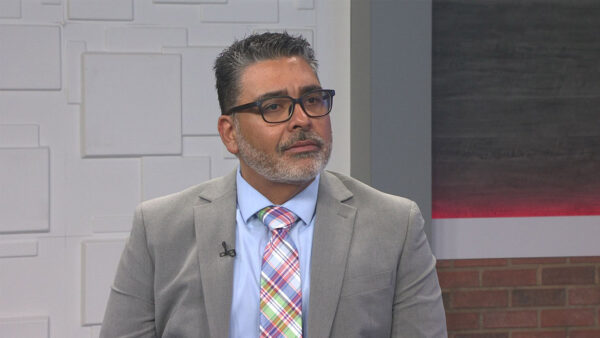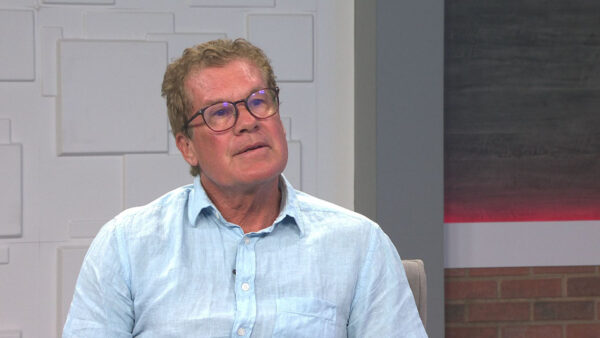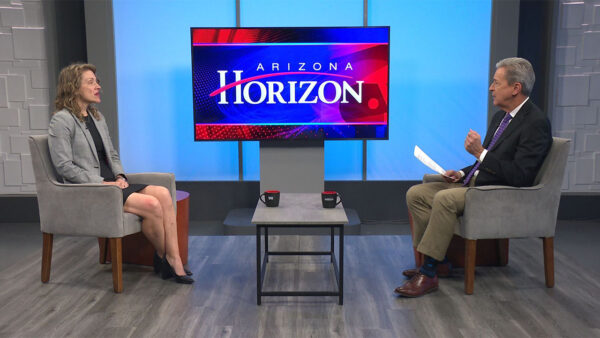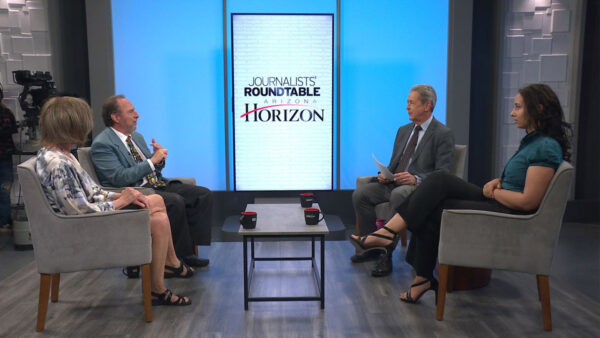AARP wants Congress to stop a cut in Medicare payments to doctors from taking effect at the end of the year. The organization says a 25% cut in reimbursement rates could make it difficult for seniors to find doctors willing to see Medicare patients. David Mitchell, AARP Arizona State Director, and Dr. Zuhdi Jasser, Arizona Medical Association, discuss the issue.
Ted Simons:
The Maricopa County board of supervisors has authorized spending about $10 million on outside attorneys to defend Sheriff Joe Arpaio and former county Attorney Andrew Thomas against legal claims. Supervisors Don Stapley and Mary Rose Wilcox refused themselves from the vote. They've both filed claims against the county. A number of other claims have been filed by county employees and others who say they were wrongly investigated or sued by Arpaio and Thomas.
Ted Simons:
AARP wants Congress to stop a cut in Medicare payments to doctors from taking effect at the end of the year. The organization says a 25% cut in reimbursement rates January 1st could make it difficult for seniors to find doctors willing to see Medicare patients. Here with more on the issue is David Mitchell, AARP's Arizona state director. And Dr. Zuhdi Jasser, a Phoenix doctor in private practice who specializes in internal medicine and nuclear cardiology. Dr. Jasser is a past president of the Arizona medical association. Good to have you both here. How real are these threatened cuts and reimbursements?
David Mitchell:
They're very real. As a matter of fact, over the last year, there have been a couple of times when Congress has actually threatened to cut those payments, and at the last minute Congress has come and stopped that and doctors have been able to be paid. But our members are very concerned about this.
Ted Simons:
Are your members aware of this overall?
David Mitchell:
Many of them are, and those that aren't will certainly hear from us through our publications, alerting them to the fact that some of their doctors may opt out of Medicare if this continues.
Ted Simons:
And I want to get to that in a second, but the idea, I've heard the word catastrophic used by doctors if these reimbursement rates are cut? Is that close to fact?
Zuhdi Jasser:
It's complete fact. The bottom line is, I hope people understand that this is a recurring story. We've talked about this in June, we talked about it in March, and what happens is they put a gun to the head of practicing physicians that can't sustain the current solvency of our practice and we're told that basically the reward is that the extended, the sustainable growth rate and they won't put into effect, now it's a 23% cut. If that takes effect, we will become insolvent. But it doesn't, we're told, we'll leave it where it is, meantime over the past year to year after year, our expenses go up, payrolls go up, medical supplies go up, rent goes up, and yet we continue to get cut more and more. Physicians are opting out of Medicare or they're saying, in Massachusetts, 44% of physicians are no lower adding new Medicare patients.
Ted Simons:
And this is all based in a late '90s law, a congressional effort in the late '90s to go ahead and do something about the deficit. Are you telling me that we have had these extensions going on for 20 some-odd years, because it hasn't happened yet, or no one is going through with the -- what's going on?
Zuhdi Jasser:
They keep calling the doctor fix, which is still as big and the price tag is -- continues to increase, it's still a small part of the Medicare budget, most of which is hospital expenses, etc., yet every year they keep focusing all on the doctor fix, and we are the ones that are the bedside with the patients, and patients have absolutely no control, and people need to understand that it's going to decrease their access to the whole health care system because the good physicians, the physicians that are the ones that the patients want to have choices to see will no longer be there for them because of that.
Ted Simons:
Especially patients -- specialist who's have patients 65 and older, and I'm sure this is part of the folks you deal with, they've got to be concerned about this.
David Mitchell:
Absolutely. They're very concerned. Half of our membership is 65 years of age and over. They are very concerned about that, thinking that perhaps they'll lose the Services of the doctor that they've actually had for many years. But surprisingly, not only those that are under Medicare, but those that are going to be under Medicare just a few years down the road. They are as equally concerned. And they're not only concerned for themselves, but they're also concerned for their parents who are dealing with this Medicare issue.
Ted Simons:
These -- this fee reduction plan start back in the '90s here, the idea was to cut the deficit. Right now the mood in this country not to raise taxes and to cut, cut, cut, I understand Medicare reimbursement plans might be complicated for some folks, but this is something that I'm not sure the country is in the mood to address right now. What do you think about that?
David Mitchell:
I think you're right. The mood of the country is not to address that issue, but it's something that has to be done. And therefore we elect people in Congress to really deal with these issues, and it's something that Congress really needs to look at. Where are the trade-offs? But this is something that needs to be addressed.
Zuhdi Jasser:
If you look at the extension, the extension in June where physicians at the time, many wanted to boycott Medicare, even though they wouldn't ethically because of the stress, we had two weeks where we didn't receive payments, and we were expected to dip into some supposed cash flow, which no longer was there, they delayed it, kicked the can down to November 30th, which is after the election, so that this lame duck Congress can deal with it. And in fact, we were promised, physicians were promised this would be tied into medical reform, and it wasn't. It was separated from it. The Pelosi house separated it, nobody held them accountable for that. And now we're finding the physicians are on the verge of aborting it, some of them are retiring early, many of them are just -- one of the things I have to tell you, people need to understand that it's not just we fix it and kick the can down another six months. The fix needs to be tied to inflation so that physicians can see the light at the end of the tunnel. It's not just Medicare. All pricing for other insurance companies are tied to the Medicare fee schedule, so it actually tips the whole solvency of physicians' practices that are not just cash-based. Many of us -- over 60% of my practice is Medicare, I can't afford to stop taking Medicare. That would mean stop practicing or have a wholesale change, which is very difficult.
Ted Simons:
And you -- the can has been kicked down so times, I'm surprised there's still a can after all these years. We should be fair, both sides here have basically said, let's just deal with this some other time. It sounds like they might be doing this again. If I'm a member of Congress, what do you stay to me when I tell you my constituents do not want to see more spending, this looks like something we can address as far as the deficit cutting maneuver, what do you tell me?
Zuhdi Jasser:
You need to put shall are free market mechanisms back into it so you can have some competition. Patients get paid -- pay the doctor the same whether they've just graduated, they've been in practice 20 years. They tell me to make it up by volume. Physicians are told to see 20, 25, 30 patients a day. And if I spend an hour with a patient I. I get the same whether I spent 15 minutes or an hour and a half because there's a max payment per visit. I would tell them to start putting in some incentives, competition, variable scaling, attach to it inflation, give patients more ability to vote with their feet where they go. We award doctors through some type of reimbursement system where patients have more control of how payments are made, and all the overhead needs to be decreased. I can't tell you how much of my practice is wasted on billing, repayments, and a lot of the things behind the scenes. And all we can bill for is that office visit.
Ted Simons:
The idea of maybe a 13-month reprieve, another kick to the can, but a 13-month with a commitment from Congress and the Obama administration that both sides, I don't care what party you're from or how you see the health care reform debate, get together, fix the issue. Is that what you want to see?
David Mitchell:
That's what AARP wants. We want during this lame duck session for Congress to take a look at this issue, deal with the particularly over the next 13 months, the reality is it needs to be fixed permanently. Because it can't be done right now, let's at least get it done through the end of 2011.
Ted Simons:
The idea of a 13-month reprieve, what are you hearing? Is that possible? Is it likely?
David Mitchell:
It's being thought about, but then we also hear rumblings that they may only do a 30-day fix. That's not going to satisfy AARP. It's not going to satisfy our members. But we're hoping for the 13-month.
Zuhdi Jasser:
The -- what's so frustrating, every one of our members in our Arizona delegation told our association they will go to bat for us and make sure this doesn't happen. And yet the vote comes down and somewhere the house ends up kicking this down and the cuts go into effect and all of a sudden we're like playing roulette with this, and next thing you know it passes just with a 1% increase, which really doesn't say what's happening.
Ted Simons:
The same constituents, excuse me, the same delegation, they have constituents who are telling them, you know, buckle down, cut, tighten, the whole nine. You understand. You've heard it. How does a congressional representative hear this and the voters voted this way as well, and then look that the and say, we've got to find money for this. We don't have the money for this.
Zuhdi Jasser:
I think most reasonable rational American citizens know that you do not expense quality -- you do not compromise quality medical care and access in order to fix the budget. There are other aspects to the budget that need to be looked at if you want to look at fiscal conservatism, but not compromising good quality care, which at the end of the day will end up costing Arizona and the United States a lot more money.
Ted Simoms:
Do you agree that there are people out there that are that rational about all this?
David Mitchell:
Well, I would hope so. That they are rational about that. They have to look at offsets. They have to look at trade-offs, because this is very critical. Medical care is so critical to everyone in this country, not just our members, but the whole population.
Ted Simons:
OK. Final question, what does it all mean in terms of health care access overall and for AARP folks?
David Mitchell:
Well, if this is not dealt with and doctors choose to bow out of Medicare, then our members don't have access to the medical care that they deserve and the medical care that they expect to get in their retirement because people have been putting money all their working life into Medicare, and they expect to see a return.
Ted Simons:
To the business side of patient care, what does it mean?
Zuhdi Jasser:
It means that physicians -- remember, physicians are businessmen and women that are looking to survive and the ton keep their lights on. So at the end of the day, this continued hamster chase that we're doing, we're going to start looking for alternatives. Ways to either at least shut the hemorrhaging that we're doing through Medicare, and then look at alternatives. And if you look at the data, physicians that opt out or find other alternatives don't end up ever coming back to Medicare. So if you don't want to see physicians starting to sign off slowly over the next few years, extending it even 13 years, I'm concerned, bawl you'll start seeing physicians say I have to figure out what I'm going to do, because come 2012, I gotta have a life vest and it's not going to be the government.
Ted Simons:
All right. Gentlemen, thank you so much for joining us. We appreciate it.
David Mitchell:AARP Arizona State Director;Dr. Zuhdi Jasser:Arizona Medical Association;





